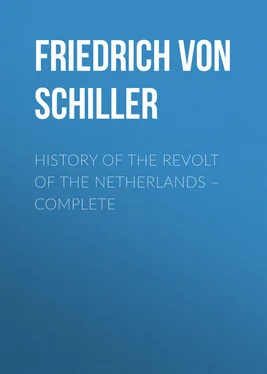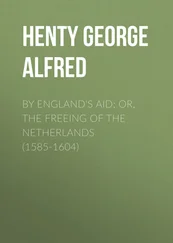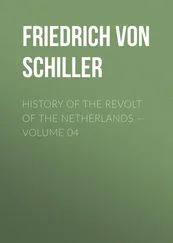Friedrich Schiller - History of the Revolt of the Netherlands – Complete
Здесь есть возможность читать онлайн «Friedrich Schiller - History of the Revolt of the Netherlands – Complete» — ознакомительный отрывок электронной книги совершенно бесплатно, а после прочтения отрывка купить полную версию. В некоторых случаях можно слушать аудио, скачать через торрент в формате fb2 и присутствует краткое содержание. Жанр: История, literature_18, foreign_antique, foreign_prose, на английском языке. Описание произведения, (предисловие) а так же отзывы посетителей доступны на портале библиотеки ЛибКат.
- Название:History of the Revolt of the Netherlands – Complete
- Автор:
- Жанр:
- Год:неизвестен
- ISBN:нет данных
- Рейтинг книги:3 / 5. Голосов: 1
-
Избранное:Добавить в избранное
- Отзывы:
-
Ваша оценка:
- 60
- 1
- 2
- 3
- 4
- 5
History of the Revolt of the Netherlands – Complete: краткое содержание, описание и аннотация
Предлагаем к чтению аннотацию, описание, краткое содержание или предисловие (зависит от того, что написал сам автор книги «History of the Revolt of the Netherlands – Complete»). Если вы не нашли необходимую информацию о книге — напишите в комментариях, мы постараемся отыскать её.
History of the Revolt of the Netherlands – Complete — читать онлайн ознакомительный отрывок
Ниже представлен текст книги, разбитый по страницам. Система сохранения места последней прочитанной страницы, позволяет с удобством читать онлайн бесплатно книгу «History of the Revolt of the Netherlands – Complete», без необходимости каждый раз заново искать на чём Вы остановились. Поставьте закладку, и сможете в любой момент перейти на страницу, на которой закончили чтение.
Интервал:
Закладка:
The welfare of the country was so far secured as was necessary to the political schemes of its master; the intelligent policy of Charles would certainly not violate the salutary regiment of the body whose energies he found himself necessitated to exert. Fortunately, the opposite pursuits of selfish ambition, and of disinterested philanthropy, often bring about the same end; and the well-being of a state, which a Marcus Aurelius might propose to himself as a rational object of pursuit, is occasionally promoted by an Augustus or a Louis.
Charles V. was perfectly aware that commerce was the strength of the nation, and that the foundation of their commerce was liberty. He spared its liberty because he needed its strength. Of greater political wisdom, though not more just than his son, he adapted his principles to the exigencies of time and place, and recalled an ordinance in Antwerp and in Madrid which he would under other circumstances have enforced with all the terrors of his power. That which makes the reign of Charles V. particularly remarkable in regard to the Netherlands is the great religious revolution which occurred under it; and which, as the principal cause of the subsequent rebellion, demands a somewhat circumstantial notice. This it was that first brought arbitrary power into the innermost sanctuary of the constitution; taught it to give a dreadful specimen of its might; and, in a measure, legalized it, while it placed republican spirit on a dangerous eminence. And as the latter sank into anarchy and rebellion monarchical power rose to the height of despotism.
Nothing is more natural than the transition from civil liberty to religious freedom. Individuals, as well as communities, who, favored by a happy political constitution, have become acquainted with the rights of man, and accustomed to examine, if not also to create, the law which is to govern them; whose minds have been enlightened by activity, and feelings expanded by the enjoyments of life; whose natural courage has been exalted by internal security and prosperity; such men will not easily surrender themselves to the blind domination of a dull arbitrary creed, and will be the first to emancipate themselves from its yoke. Another circumstance, however, must have greatly tended to diffuse the new religion in these countries. Italy, it might be objected, the seat of the greatest intellectual culture, formerly the scene of the most violent political factions, where a burning climate kindles the blood with the wildest passions – Italy, among all the European countries, remained the freest from this change. But to a romantic people, whom a warm and lovely sky, a luxurious, ever young and ever smiling nature, and the multifarious witcheries of art, rendered keenly susceptible of sensuous enjoyment, that form of religion must naturally have been better adapted, which by its splendid pomp captivates the senses, by its mysterious enigmas opens an unbounded range to the fancy; and which, through the most picturesque forms, labors to insinuate important doctrines into the soul. On the contrary, to a people whom the ordinary employments of civil life have drawn down to an unpoetical reality, who live more in plain notions than in images, and who cultivate their common sense at the expense of their imagination – to such a people that creed will best recommend itself which dreads not investigation, which lays less stress on mysticism than on morals, and which is rather to be understood then to be dwelt upon in meditation. In few words, the Roman Catholic religion will, on the whole, be found more adapted to a nation of artists, the Protestant more fitted to a nation of merchants.
On this supposition the new doctrines which Luther diffused in Germany, and Calvin in Switzerland, must have found a congenial soil in the Netherlands. The first seeds of it were sown in the Netherlands by the Protestant merchants, who assembled at Amsterdam and Antwerp. The German and Swiss troops, which Charles introduced into these countries, and the crowd of French, German, and English fugitives who, under the protection of the liberties of Flanders, sought to escape the sword of persecution which threatened them at home, promoted their diffusion. A great portion of the Belgian nobility studied at that time at Geneva, as the University of Louvain was not yet in repute, and that of Douai not yet founded. The new tenets publicly taught there were transplanted by the students to their various countries. In an isolated people these first germs might easily have been crushed; but in the market-towns of Holland and Brabant, the resort of so many different nations, their first growth would escape the notice of government, and be accelerated under the veil of obscurity. A difference in opinion might easily spring up and gain ground amongst those who already were divided in national character, in manners, customs, and laws. Moreover, in a country where industry was the most lauded virtue, mendicity the most abhorred vice, a slothful body of men, like that of the monks, must have been an object of long and deep aversion. Hence, the new religion, which opposed these orders, derived an immense advantage from having the popular opinion on its side. Occasional pamphlets, full of bitterness and satire, to which the newly-discovered art of printing secured a rapid circulation, and several bands of strolling orators, called Rederiker, who at that time made the circuit of the provinces, ridiculing in theatrical representations or songs the abuses of their times, contributed not a little to diminish respect for the Romish Church, and to prepare the people for the reception of the new dogmas.
The first conquests of this doctrine were astonishingly rapid. The number of those who in a short time avowed themselves its adherents, especially in the northern provinces, was prodigious; but among these the foreigners far outnumbered the natives. Charles V., who, in this hostile array of religious tenets, had taken the side which a despot could not fail to take, opposed to the increasing torrent of innovation the most effectual remedies. Unhappily for the reformed religion political justice was on the side of its persecutor. The dam which, for so many centuries, had repelled human understanding from truth was too suddenly torn away for the outbreaking torrent not to overflow its appointed channel. The reviving spirit of liberty and of inquiry, which ought to have remained within the limits of religious questions, began also to examine into the rights of kings. While in the commencement iron fetters were justly broken off, a desire was eventually shown to rend asunder the most legitimate and most indispensable of ties. Even the Holy Scriptures, which were now circulated everywhere, while they imparted light and nurture to the sincere inquirer after truth, were the source also whence an eccentric fanaticism contrived to extort the virulent poison. The good cause had been compelled to choose the evil road of rebellion, and the result was what in such cases it ever will be so long as men remain men. The bad cause, too, which had nothing in common with the good but the employment of illegal means, emboldened by this slight point of connection, appeared in the same company, and was mistaken for it. Luther had written against the invocation of saints; every audacious varlet who broke into the churches and cloisters, and plundered the altars, called himself Lutheran. Faction, rapine, fanaticism, licentiousness robed themselves in his colors; the most enormous offenders, when brought before the judges, avowed themselves his followers. The Reformation had drawn down the Roman prelate to a level with fallible humanity; an insane band, stimulated by hunger and want, sought to annihilate all distinction of ranks. It was natural that a doctrine, which to the state showed itself only in its most unfavorable aspect, should not have been able to reconcile a monarch who had already so many reasons to extirpate it; and it is no wonder, therefore, that be employed against it the arms it had itself forced upon him.
Читать дальшеИнтервал:
Закладка:
Похожие книги на «History of the Revolt of the Netherlands – Complete»
Представляем Вашему вниманию похожие книги на «History of the Revolt of the Netherlands – Complete» списком для выбора. Мы отобрали схожую по названию и смыслу литературу в надежде предоставить читателям больше вариантов отыскать новые, интересные, ещё непрочитанные произведения.
Обсуждение, отзывы о книге «History of the Revolt of the Netherlands – Complete» и просто собственные мнения читателей. Оставьте ваши комментарии, напишите, что Вы думаете о произведении, его смысле или главных героях. Укажите что конкретно понравилось, а что нет, и почему Вы так считаете.












